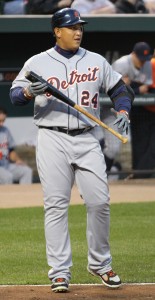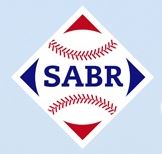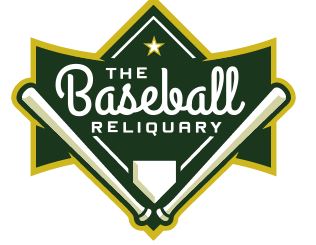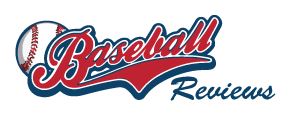In the next few posts, BBRT will be taking a look at the upcoming MLB 2012 Regular Season Awards – MVP, Cy Young, Rookie of the Year, Manager of the Year. We’re starting with the most controversial award of 2012 – American League MVP. The Tigers’ Triple Crown winner Miguel Cabrera and the Angels’ spectacular rookie Mike Trout each have plenty of supporters and statistics – from Batting Average to On Base Percentage to Wins Above Replacement – are being tossed around like hand grenades.
In a tight contest, BBRT would give the AL MVP to Cabrera over sure-thing Rookie of the Year Mike Trout – and not just on the basis of Cabrera’s rare Triple Crown achievement. Let’s look at the logic.
First, of course, we all know that Cabrera won the first Triple Crown in 45 years. How much an edge is that in the race for MVP? For BBRT, the three legs of the Triple Crown are weighed equally with a host of other stats. Let’s look.
Batting Average
This is close, Cabrera leads the league at .330, but Trout is right behind, second in the league, at .326. Very slight edge to Cabrera.
Home Runs
Cabrera enjoys a big lead in total HRs with his AL best 44, but Trout showed solid power as well. His 30 round trippers ranked 13th in the AL. BBRT gives a moderate edge to Cabrera. (Some might argue that Trout spent most of April in the minors, but for the season he had only 63 fewer at-bats.)
RBI
Big edge to Cabrera, a league-leading 139, to Trout’s 83 (13th in the league). But we need to take into account that Trout is a lead-off hitter and Cabrera is a middle of the line-up guy.
With the big three out of the way, Cabrera has a bit of an edge. Now, let’s look deeper.
Runs Scored
Trout led the AL at 129 (despite a late-April call-up). Cabrera, however, was no slouch. His 109 runs scored were second only to Trout. And, here again, for different reasons, we must keep in mind that Trout was leading off. Still, slight advantage Trout.
Hits
Cabrera’s 205 were second in the league, but Trout’s 182 placed him tenth (and, again, he was called up in late April.) Call this one a draw.
Doubles/Triples
Cabrera had a large lead in doubles 40 to 27, but that was offset by Trout’s 8 to 0 lead in triples. Another toss-up.
Stolen Bases
Trout by far, a league-leading 49 to Cabrera’s four – making Trout a unique power-speed threat.
On Base and Slugging Percentage
Trout’s .399 OBP was third in the league, just besting Cabrera’s .393 (AL 4th) – while Cabrera’s .606 league-leading Slugging Percentage topped Trout’s .564 (third). Six of one, half-dozen of another here.
So, now we’re through most offensive stats – and it’s very close. BBRT sees a slight edge to Cabrera, but it’s still debatable.
Now, some offensive stats not too many are talking about.
Bases on Balls
Surprisingly, not a lot of free passes for either of these offensive stars. Trout’s 67 walks were one more than Cabrera. Toss up.
Strikeouts
Let’s face it, K’s are pretty much wasted at-bats. A surprise here, Trout fanned 139 times (not expected from your lead-off man) to 98 for Cabrera (a more respectable number for the middle of the line-up). Trout fanned 41 more times – in 63 fewer at bats. Edge – Cabrera.
Defense
Trout takes the lead here, a potential Gold Glove candidate. But, we have to keep in mind that Cabrera moved over the third base to enable the acquisition of Prince Fielder – a valuable concession from a team point of view. Ultimate advantage, still a healthy one for Trout, but not weighted as heavily here as in some other quarters.
Other factors
Remember, this is not a Best Player or even Best All-Around Player award; this is Most Valuable Player – what you mean to your team.
BBRT give Cabrera an edge here, with Detroit coming back to win the Division
and the Angels at home watching the post season after finishing third in their Division and four games behind in the Wild Card race. The fact is, without Cabrera, the Tigers, like the Angels, would already be home. Without Trout, the Angels would probably still have finished third – just a little closer to Seattle. BBRT agrees that Trout did spark the Angels, just not enough to make a difference in the final division standings.
And what about the impact as the pennant race unfolded? Consider what the two accomplished through the “Dog Days” of August, and the critical September/October time frame. As Bill Madden of the NY Daily News noted: from August 1 on, Cabrera .344, 19 HRs and 54 RBI – Trout .287, 12 HRs and 28 RBI. As the race heated up, Cabrera got hotter, while Trout seemed to fade a bit.
Further, Cabrera went through the season with the expectations placed on a veteran leader – to inspire, mentor and motivate – to be a clubhouse leader. Trout was a rookie, expected to learn from team leaders like Albert Pujols and Torii Hunter.
So yes, Trout, at 21, became the first rookie and youngest member of the 30-40 club (30 homers and 40 stolen bases) – and, to BBRT even more impressive, was only one stolen base from joining the elite 30-50 club, which includes only Eric Davis and Barry Bonds. An argument may, in fact, be made for Trout being very close to – if not the – best all-around, five-tool player of 2012.
But, again, this award does not recognize the “best” player, but rather the “most valuable.” When you add it all up, BBRT’s MVP vote goes to Miguel Cabrera (WAR not withstanding) – not just for for his full-season performance on the field (all those stats being tossed around), but also for his contributions down the stretch, his willingness to cross the diamond from first base to third base for the good of the team, and the expectations placed on him as a veteran and team leader.
Watch BBRT for a soon-to-come (and briefer) look at the other 2012 Awards: NL MVP; AL & NL Cy Young; AL & NL Rookie of the Year; and AL & NL Manager of the Year. There’s some spirited competition, but far less controversy.







